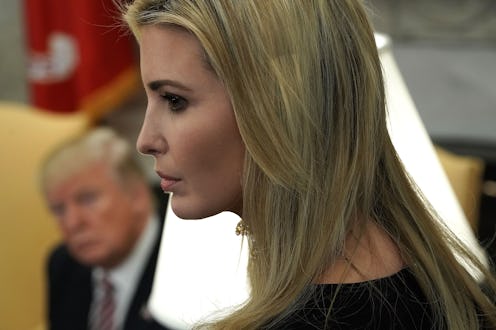News
How Ivanka Trump Helped This Super Controversial Anti-Sex Trafficking Bill Become Law

On Wednesday, the president of the United States signed a controversial bill into law, and he gave his eldest daughter the credit for it. Specifically, President Donald Trump credited Ivanka for FOSTA's passage, the Fight Online Sex Trafficking Act, and she herself took a victory lap on Twitter after it was signed.
"And I have to give credit to Ivanka Trump," Trump said, saluting his daughter for her outspoken advocacy in support of the bill, as Newsweek detailed. "She's here someplace. She's been a great representative, I will say."
Ivanka, whose role as a White House adviser is extremely controversial and unusual in light of her familial relationship to the president, reportedly assumed human trafficking and sex trafficking as part of her policy portfolio while in the administration. Last month, she hosted a round-table event with lawmakers and private sector leaders to promote the bill's passage, and her efforts have drawn credit from Republican lawmakers.
In particular, Ohio senator Rob Portman and California representative and House Majority Leader Kevin McCarthy both praised Ivanka for her support of the bill, with Portman saying Trump was "correct about Ivanka" and offered her thanks for bringing legislators together in last month's round-table in support of the bill.
Missouri representative Ann Wagner, who sponsored the House bill FOSTA, credited Ivanka for her role in promoting the bill, calling her "one of the moving forces in this arena," and hailing her ability to influence opinion simply by tweeting.
"This is someone who can raise a level of awareness just by talking about it, by tweeting something out, by bringing legislators together," she said, as detailed by CNN.
The bill ― or rather, the law, since it's now been signed by the president ― went by two different names throughout it's time in the legislature, FOSTA in the House, and SESTA in the Senate. The version that ultimately passed retained the acronym FOSTA.
The legislation, however, has been denounced and opposed by many different organizations representing sex workers and sex trafficking survivors alike, on the grounds that it'll target websites which sex workers rely on to make a safe and secure livelihood.
As a result, FOSTA's signing into law is being received as terrible news by many sex workers and their advocacy organizations, even as it's being hailed as a rare win for bipartisan comity and cooperation by some mainstream media outlets. For example, CNN characterized FOSTA's passage and signing as a "rare bipartisan victory" on Wednesday.
Indeed, the bill was passed in an overwhelmingly bipartisan fashion, which is unusual in today's climate of hyper-polarized politics. Only two U.S. senators voted against SESTA, the senate version of the bill ― Sen. Marco Rubio of Florida and Sen. Ron Wyden of Oregon ― while it similarly passed with very little opposition in the House, with just 14 Republicans and 11 Democrats dissenting.
Groups as ideologically diverse as the American Civil Liberties Union (ACLU), the National Center for Transgender Equality, and the libertarian, Charles Koch-founded Cato Institute all opposed the law, but that didn't stop it's passage by overwhelming Democratic and Republican majorities.
It's feared that the law's implementation will actually make life harder for people who make their livings through sex work. As ThinkProgress detailed last month, the law could shutter online forums where sex workers are able to inform one another about dangerous clients, seek housing or other assistance, or simply offer their services to a broad clientele.
In some cases, these changes are already taking place; Craigslist, for example, has closed its personals section in response to the new law, in an effort to avoid potential legal repercussions. Perhaps the website most threatened by the law, Backpage, was seized by the Department of Justice last week, prior to the new law even having been signed.
Ivanka, for her part, has not spoken publicly on these criticisms and concerns, however. To the contrary, she's consistently framed this as an unqualified win against sex trafficking, calling it an "important piece of legislation" which will "bring us one step closer to ending sex trafficking online and restoring safety in our communities."
In terms of actual new laws, this is without a doubt the most consequential piece of enacted policy to which she's put her name and face. It strikes a sharp contrast with last year, when she reportedly sought to downplay her influence within the White House, following a number of decisions by her father (most notably on transgender soldiers in the military and the Paris climate accords) that cut against her own stated policy goals.